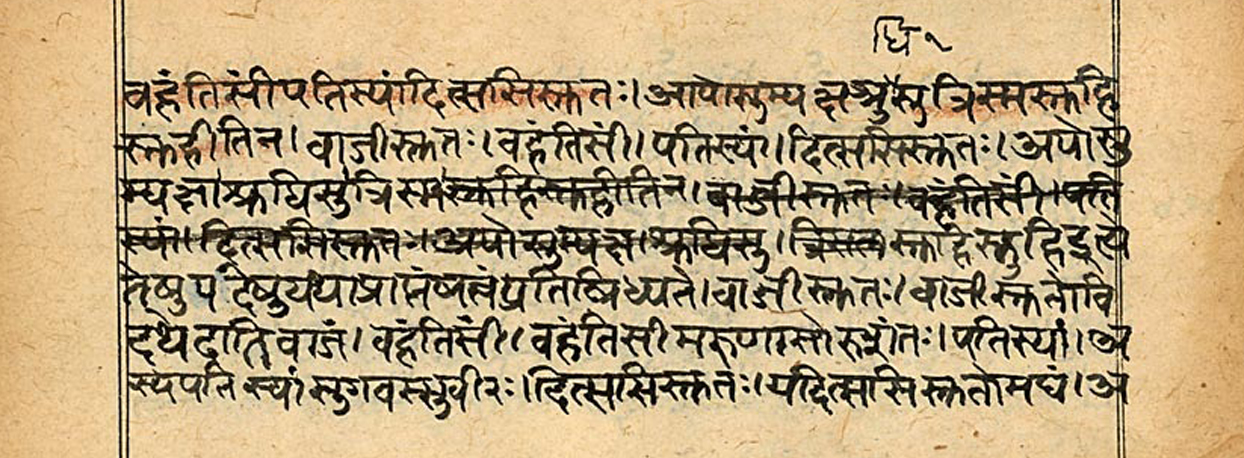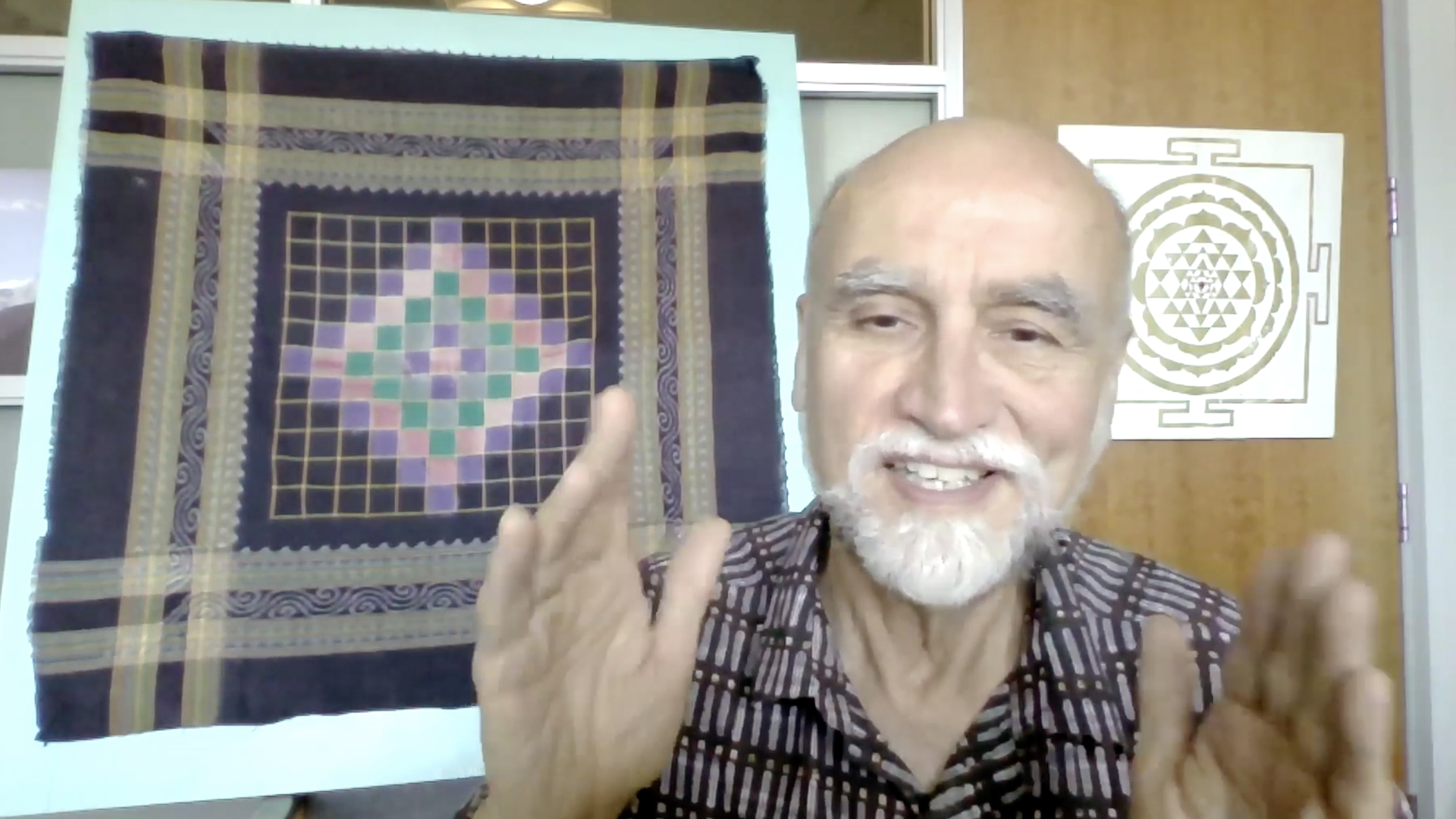
Courses and Certificate in Yoga Philosophy
The Yoga Philosophy program offers a number of online short courses that provide a foundational introduction to the spiritual and philosophic traditions that inform yoga, and is designed to enrich one's own yoga practice or even advance one's career as a teacher. Online classes, marked as YGPX, are offered each semester and enrollment is open (upcoming courses are listed below under Schedule + Location). Students must complete 120 hours of coursework for Certificate in Yoga Philosophy. Details are below under General Information
Yoga comes from the Sanskrit word yuj, which means to yoke, join, or apply. Yoga is usually translated as union, for its methods and practices lead to a profound integration of body, mind, and spirit. The yogic ideal is to achieve complete freedom and authenticity by transcending the limiting structures of the ego-personality (the person we behave as on a normal day) and discovering the true spiritual Self within.
Yoga is a set of spiritual practices but in itself is not an institutionalized religion, per se. Hinduism is related to yoga through a common recognition of the Vedas as an authoritative source, and both Buddhism and Jainism share many of the core values of the yoga tradition. But Classical Yoga is best understood as a system of spiritual practice, rather than a particular religion.
The Yoga Philosophy professional certificate program provides a foundational introduction to these spiritual and philosophic traditions. Students must complete a total of 12.0 semester hours in coursework to receive a certificate of completion in Yoga Philosophy (see Course Requirements below).
Who Should Participate
This program is designed for yoga teachers and students of yoga who have an interest in learning about the rich traditions associated with yoga practice. These include Classical Yoga, various schools of Hinduism (Shaiva, Vaishnava, and various forms of devotionalism), Buddhism, and Jainism.
Program Benefits
Students who study yoga philosophy have the rare opportunity to immerse themselves in the rich history and culture of Yoga. Students will be exposed to the language and root texts on yoga which emerged from classical period of Indian history, which are foundational to the modern practice of yoga in the United States. Upon successful completion of this program, students will be able to:
- Appreciate and understand the historical and cultural context of yoga
- Understand and teach from the Yoga Sutra of Patanjali, which continues to be revered by scholars and practitioners alike as the most coherent and authoritative outline of the fundamental principles of Classical Yoga
- Value the root texts on yoga in its original language
Emphasis in Ayurveda Self Care
Students have the option of completing their elective course work in Ayurveda Self Care as a focus in the Yoga Philosophy program. Ayurveda, considered one of the world’s first comprehensive medical sciences, offers a developed and comprehensive philosophical construct that defines the fundamental energetic nature of humans, and our interaction with our environment. Students will learn the relevant basics of Ayurveda related to the systems of the body, lifestyle practices, the subtle energetic body, deeper and psychospiritual applications, and explorations of further study. Learn how to adapt a multifaceted yoga practice for the seasons and other cycles of the world in which we live. Explore how to utilize Ayurveda’s tools and techniques for the purposes of Yoga therapy. Understand your own unique nature. Appreciate the Ayurvedic energetics of a variety of practices. Learn essential techniques for stress reduction, resilience, and rejuvenation. The relevant coursework will cover the basics of Ayurveda, including systems of the body, lifestyle practices, the subtle energetic body, deeper and psychospiritual applications, and explorations of further study. Ayurveda Self Care is offered in during the Fall term.
General Information
Course and program requirements, schedules and tuition are subject to change; and additional fees may be incurred for books and materials. Click here to review all policies prior to enrollment. For additional information, contact BCLA Yoga Studies at (310) 258-5435 or YogaStudies@lmu.edu.
Please note: because this is a fully online program, enrollment eligibility is dependent on place of residency. Please review State Authorization before enrolling.
-
Courses are offered each term, and prospective students may begin this program at any time. Students register for each course individually via the course catalog. Not all courses are offered each term. Please review the course requirements below for the certificate program.
Next Course: Upcoming courses are listed below under "Schedule" and in the course catalog.
Tuition: $208 a unit
-
Courses required for this program are offered during the Fall, Spring and Summer terms. Schedules vary for individual courses. Please consult the course catalog for individual course times, locations, and requirements.
Upcoming Courses
Fall 2024 offerings and dates will be announced soon.
Connecting Online
MyLMU is the primary Internet-based portal for students, faculty and staff at Loyola Marymount University. Once you log in to the portal with your credentials, you can directly and securely access the various online learning platforms, including Brightspace and Zoom, and your student record. Click here to begin.
-
- Christopher Key Chapple, Ph.D., Coordinator
- Dr. Abhishek Jain, Bhagwan Mallinath Visiting Assistant Professor of Jain Studies
- Dr. Zoe Slatoff, Clinical Professor
- Felicia Tomasko
- Siva Mohan
-
Students must complete a total of 12.0 semester hours in coursework with a letter grade of 'B-' or higher in each course to receive a certificate of completion. This includes each of the required five courses totaling 7.0 semester hours (marked below with an asterisk*), as well as 5.0 semester hours of elective course work in Yoga Philosophy.
Please refer to the course catalog for required text, class meeting location, and other general information.
Required Coursework: YGPX 800, 816, 817, 818, 819, and five (5) semester hours of elective coursework (see course descriptions below for additional information).
-
YGPX 800*
Sanskrit I
2.0 Semester HoursThis introduction is intended to provide students with a foundational understanding of the legacy and unique qualities of the Sanskrit language and to serve as an effective springboard for those who wish to embark on Sanskrit translation efforts. Students will examine the sound system of Sanskrit and the traditional Indian writing system known as Devanagari. Basic principles of proper pronunciation will be demonstrated by directing attention to many Sanskrit technical terms used in yoga and meditation traditions, including the names of yogic asanas and the chanting of select mantras and seed syllables. Students will also be broadly introduced to the essential linguistic elements required for translation work, including the rules of sandhi or “euphonic combination” and the basic grammatical principles underlying the conjugation of verbs and the declension of nouns.
YGPX 801
Sanskrit II
2.0 Semester HoursThe course builds on students basic acquaintance with the linguistic elements of the Sanskrit language, including the special arrangement of phonetic sounds of the Sanskrit and the Devanagari system of writing. This is a translation course rather than a conversation course. Each meeting new grammatical elements of the language will be introduced, followed by the assignment of translation exercises from Sanskrit into English and English into Sanskrit. Prerequisite: Sanskrit I or other prior instruction
YGPX 810
Sanskrit Reading Course
1.0 Semester HoursIn this special Sanskirt reading class, students will read and translate Sanskrit text. Prerequisites: Sanskrit I
YGPX 816*
Yoga Sūtra of Patañjali
2.0 Semester HoursThe Yoga Sūtra of Patañjali is perhaps the seminal work on the meaning and purpose of Yoga. The study of this text is not simply an academic curiosity, but a vital means of deepening our self-understanding and transforming our consciousness. In this seminar, we will explore essential teaching from all four chapters through not only lecture and dialogue, but also through integrated practices such as chanting and meditation. View course details here.
YGPX 817*
Samkhya Karika
1.0 Semester HoursThe Samkhya Karika by Ishvarakrishna is the root text of the Samkhya system, which is regarded as one of the six darshanas or foundational perspectives of orthodox Hindu thought. Consisting of only seventy-five aphorisms, the Samkhya Karika outlines a basic metaphysical perspective that informs some of the core teachings of the Bhagavad Gita, Patanjali's Yoga Sutra, and the traditions of hatha yoga, tantra, and Kashmir Shaivism. In this five-week course, we will thoroughly examine the concepts of purusha and prakriti, the three gunas, and the other twenty tattvas or metaphysical principles outlined by the system. Students will gain an enhanced understanding of the concept of moksha or spiritual liberation as understood in the Indic contemplative traditions. View course details here.
YGPX 818*
Upanishads
1.0 Semester HoursThe Upanishads constitute the philosophical insights of the early sages of India and also document some of the earliest practices of Yoga. Study the key ideas of the Upanishads, including non-dualism, the identity between Self (Atman) and Supreme Consciousness (Brahman), and the ineffability of the absolute. View course details here.
YGPX 819*
Bhagavad Gita
1.0 Semester HoursThe Bhagavad Gita encapsulates the primary features of Yoga practice. It narrates the story of a confused warrior seeking counsel from his charioteer (Lord Krishna) who illuminates the nature of various Yoga practices. Learn key Sanskrit verses, read through and discuss the entire text, and explore the meaning of such topics as the three gunas (core constituents of reality) and visionary consciousness. View course details here.
YGPX 894
Ayurveda Self Care I
5.0 Semester HoursThis course serves as an introduction to the history, philosophy, and modern practice of Ayurveda. Ayurveda is considered by many to be world’s first comprehensive medical science and system of wellness. It is based in Samkhya philosophy, and even though it has ancient origins, the teachings contain a great deal of knowledge, wisdom, and practices that are not only relevant in the modern world, but contain essential information on how to live lives centered on health and wellness. This course fulfills one of the elective requirements for the Yoga Philosophy Certificate and is part of the required curriculum for the YTRX C-IAYT certificate eligibility. It is open to yoga teachers, yoga students, yoga therapists and anyone interested in yoga philosophy. No prior knowledge of Ayurveda, Yoga, or Sanskrit is required. View course details here.
YGPX 984
Jain Faith and Practice
1.0 Semester HoursThis course will explore Jain cosmology, ethics, and meditative practices. Pre-dating Buddhism, Jainism established a comprehensive worldview that emphasizes nonviolence, honesty, and simplicity. We will examine its history and ongoing global relevance. View course details here.
YGPX 820-899, 901-905
Elective Studies
1-2 Semester Hours* indicates that course is required for the certificate program
